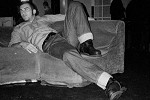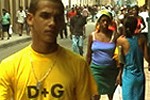 SHADOWS ARTHOUSE FILMS ’05
SHADOWS ARTHOUSE FILMS ’05< < M O R E | M O R E > >
last update 20.Mar.05
See also: SHADOWS FILM FESTIVAL | SHORT FILMS
 R E V I E W B Y R I C H C L I N E
R E V I E W B Y R I C H C L I N E
 This is one of those accomplished indie films that shows Hollywood for the shallow, lazy factory that it is. Writer-director Bardwell throws out formulae and creates a bracingly original comedy-drama about growing up. There's not a cliche in sight, the characters are recognisably real, and the story cycles through comedy and emotion with honesty, warmth and real wit.
This is one of those accomplished indie films that shows Hollywood for the shallow, lazy factory that it is. Writer-director Bardwell throws out formulae and creates a bracingly original comedy-drama about growing up. There's not a cliche in sight, the characters are recognisably real, and the story cycles through comedy and emotion with honesty, warmth and real wit.
Dorian (McMillian) is the eldest of two teenage sons, but it's his brother Nick (Coco) who gets all the attention from Dad (Fletcher), because he's more confident, charming and athletic. Their mother (Quigley) doesn't seem to notice any of this. Dorian struggles along with an artist's soul, trying to figure out what's wrong with himself, and finally comes to the extremely reluctant realisation that he might be gay. As he heads off to university in New York City, he hopes to be able to make sense of his life.
This is a brilliantly well-written script--insightful, hilarious and ultimately profoundly moving. The first half of the film is basically a comedy, but Bardwell doesn't shy away at all from the difficult aspects of family relationships, especially parental expectations and the blessings/curses of denial. The dialog crackles with terrific one-liners and beautifully illuminating observations. Romance and relationships are outlined in a realistic way--wistful and hopeful and yet crushingly difficult. It's so authentic and accessible that it feels autobiographical; every detail is exactly right, from strained conversations to internal yearnings. But this isn't Bardwell's story--he sees himself more like Nick, and was inspired to write the film by a friend at university who died of Aids in 1991.
The cast is excellent, even though none of the characters is totally likeable; McMillian and Coco deliver especially strong performances as strikingly realistic brothers trying desperately to understand each other. Fletcher and Quigley take stereotypes and stand them on their heads. And the actors playing Dorian's university friends and lovers are remarkably true to life--funny, loyal, treacherous. This is one of the best films ever made about coming out--not just sexuality-wise, but as a grown-up human being in the face of who everyone else wants you to be.
with Michael McMillian, Lea Coco, Steven C Fletcher, Mo Quigley, Sian Heder, Chris Dallman, Cody Nickell, Austin Basis, Ryan Kelly Berkowitz, Carl Dana, Leslie Elliard, Jeff Paul
 release US 19.Nov.04,
release US 19.Nov.04,UK 31.Mar.05 llgff
04/US 1h28

19.Mar.05 llgff
 R E V I E W B Y R I C H C L I N E
R E V I E W B Y R I C H C L I N E
 Jones' film is more like an essay than a documentary. It springs from a series of photographs he took of young Latino Morrissey fans in Southern California, which does seem like an odd place to find devotees of a sexually ambiguous British songsmith. But there you go.
Jones' film is more like an essay than a documentary. It springs from a series of photographs he took of young Latino Morrissey fans in Southern California, which does seem like an odd place to find devotees of a sexually ambiguous British songsmith. But there you go.
Basically, Jones is backing up his evocative black and white photos with extensive video interviews, punctuated by his drab voiceovers and a few cheeky appearances on screen. The people he talks to aren't particularly articulate or knowledgeable, but Jones encourages them to analyse their own affection for Morrissey and the Smiths--how they discovered this music to begin with, why it strikes a chord, why it appeals to an Hispanic audience, how it fits in with California culture. Their observations are intriguing, even if they might not be particularly insightful.
The problem with the film is that the most interesting thing about it is the premise. Which means that Jones' photographs are actually more stirring than the interviews are. There are good bits here and there, such as when the interviewees start dissecting Morrissey's whole 1950s James Dean thing, contemplating his sexual identity and reminiscing about the times when they met their hero. And Jones has some important observations as well, such as his comments on Los Angeles geography and the fact that the real hotbed of youth culture is in Pomona 91766 and the Inland Empire, rather than Beverley Hills 90210 and the O.C.
There's also a nice interlude when Jones actually meets Morrissey for a photo shoot, which we witness through the photos themselves, accompanied by Jones' reminiscences of the event. This is by far the most interesting part of the film, simply because it's actually about an encounter with the man in question, rather than a portrait of a man by people who really don't know him at all.
with William E Jones, Jose Maldonado, Jeff Stodel, Brigette Jimenez, Anita Balandra, Melissa Szabo, Jaysin Fail, Joel Cortez, Mary Morales, Mark Flores, Dave Ehrlich, Hillary Jaynes
 release UK 10.Apr.05 llgff
release UK 10.Apr.05 llgff04/US 1h20

17.Mar.05 llgff
 R E V I E W B Y R I C H C L I N E
R E V I E W B Y R I C H C L I N E
 This intriguingly well-made documentary tells us just about everything we could possibly want to know about the mesmerising 1970s singer Klaus Nomi. Seemingly from another planet, Nomi had a supernova career that flamed quickly and was extinguished prematurely by his death in 1983.
This intriguingly well-made documentary tells us just about everything we could possibly want to know about the mesmerising 1970s singer Klaus Nomi. Seemingly from another planet, Nomi had a supernova career that flamed quickly and was extinguished prematurely by his death in 1983.
From his birth in Germany to Bohemian poverty to Warhol-era New York fame, Klaus Sperber was an intriguing figure, combining his strong falsetto with new wave electronica and creating a surreal stage persona that no one could quite figure out. And with his combination of opera, rock, punk and, erm, pie baking, it was unclear whether he was for real, being ironic or just a joke. His androgynous look and camp manner were like something from a Saturday Night Live sketch. Indeed, his biggest moment came during an SNL appearance alongside David Bowie.
This is a straightforward doc, assembled without narration, telling Nomi's story through archival footage and extensive interviews with people who knew him. It's edited chronologically, and the material is often so profoundly intimate that we get a strong idea what the man was like. Despite his constant cheeky smile, there's a terrible sense of sadness around him. Even the people closest to him saw him as lonely, a freak among freaks, robbed blind by the record industry. He appears to have never found real love, and when he came down with Aids everyone was still calling it 'gay cancer'.
The film vividly captures his fascinating performances, from the development of his Nomi style to details such as where he got his trademark triangular tuxedo. We also feel his larger-than-life personality, the face he presented in his performances. And like the people around him, we only get brief glimpses of him as a human being. But then, he did claim to be an alien.
with Klaus Nomi, Ann Magnuson, Gabriele Lafari, David McDermott, Page Wood, Kristian Hoffman, Ron Johnsen, Tony Frere, Man Parrish, Anthony Scibelli, Michael Halsband, Jay Jay French
 release UK 26.Oct.04 lff,
release UK 26.Oct.04 lff,US 4.Feb.05
04/Germany 1h36
BERLIN FILM FEST
LONDON FILM FEST
LONDON L&G FILM FEST
14.Mar.05 llgff
 R E V I E W B Y R I C H C L I N E
R E V I E W B Y R I C H C L I N E
 Subtitled "life and dreams on the streets of young Cuba", this intriguing documentary simply follows five young men as they swap a D&G t-shirt (a pullover, geddit?) and take turns telling their stories. They're aged from 19 to 22 and all are working the streets of Havana as rent boys. They're not all gay--at least two of them aspire to a wife and kids and a house in the country--but they're all making a living by subverting a society in which getting ahead is almost impossible.
Subtitled "life and dreams on the streets of young Cuba", this intriguing documentary simply follows five young men as they swap a D&G t-shirt (a pullover, geddit?) and take turns telling their stories. They're aged from 19 to 22 and all are working the streets of Havana as rent boys. They're not all gay--at least two of them aspire to a wife and kids and a house in the country--but they're all making a living by subverting a society in which getting ahead is almost impossible.
This is an honest, street-level look at Cuban society. Filmmaker Schmoll mostly avoids the obvious views to show us the small world these guys inhabit. All of these young men have traveled into the city illegally; one recounts a month in jail before being deported back to the country for not having the proper resident permit. All of them dream of a future in which life is easier than it is now. And all of them are working as prostitutes among the tourists. In the evening, they have illicit gatherings where gay men, escorts and transvestites can be themselves ... as long as they can outsmart the cops. As one guy observes, "Everything is illegal in Cuba."
The film's very nicely shot, catching tiny details both visually and in the sound mix. As it moves from Havana into the countryside, we vividly see how everything changes from the impressive showcase city to a desolate, poverty-stricken landscape of broken homes and shattered dreams. The voiceovers touch on economics, religion, family, culture and death--but always in an extremely personal, observational way. These guys are under-educated and rather under-informed about the world (one dreams of moving to Miami to become a famous break-dancer). Many scenes are rambling and random. And the film is a little creepy at times (the camera crew seems a bit too close to the subjects), completely ignoring the dangers of this profession. But the overall result is a telling and fascinating profile of a side of Cuba Castro clearly doesn't want anyone to see.
with Ernesto, Raul, Leonardo, Lesdyan, Rafael
 release UK 2.Apr.05 llgff
release UK 2.Apr.05 llgff04/Spain 1h00

20.Mar.05 llgff


See also: SHADOWS FILM FESTIVAL | SHORT FILMS
© 2005 by Rich Cline, Shadows
on the Wall